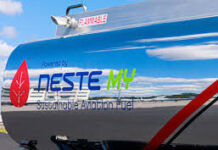
The US aviation regulator the Federal Aviation Administration (FAA) has pledged almost $300m in grant aid to help achieve America’s goal of net-zero emissions from aviation by 2050.
The goal is a vital part of outgoing US President Joe Biden’s Investing in America Agenda.

The $291m, to be spent on a number of initiatives, will come from the Inflation Reduction Act which awards grants to net-zero-related business projects.
“The Biden-Harris Administration is committed to enhancing the safety, sustainability and efficiency of our national air transportation system—and reaching our mid-century target of net-zero emissions,” said US Secretary of Transportation Pete Buttigieg.

“These grants will help put the world on a path toward decarbonising aviation while fostering domestic economic growth and ensuring the US retains its global leadership in aviation.”
“The projects are instrumental in advancing our environmental and economic sustainability goals by facilitating the development and implementation of sustainable aviation fuels,” said Laurence Wildgoose, FAA Assistant Administrator for Policy, International Affairs and Environment.
“All grant recipients are based in the US and are working towards putting the aviation sector on a path to achieving net-zero greenhouse gas emissions as outlined in the US Aviation Climate Action Plan.”
The Fueling Aviation’s Sustainable Transition (FAST) grants include:
- $244.5 million for 22 projects that produce, transport, blend or store sustainable aviation fuel (SAF) and for scoping studies related to SAF infrastructure needs. SAFs are jet fuels made from renewable sources that reduce carbon pollution on a lifecycle basis compared to conventional jet fuel and can be used safely in today’s aircraft and engines. These grants will expand SAF production, enhance SAF supply chains, and increase SAF accessibility.
$46.5 million for 14 projects that develop, demonstrate or apply low-emission aviation technologies. These grants will reduce carbon pollution, improve aircraft fuel efficiency, and increase SAF use.
Example grant awards include:
- $16.8 million to Gevo, Inc. to convert an existing fuel facility in Luverne, Minnesota, to a fully integrated alcohol-to-jet facility for SAF production.
$240,000 to the City of Atlanta to conduct a study of regional supply chains, infrastructure and distribution needs to enable SAF deployment at Hartsfield-Jackson Atlanta International Airport in Georgia.
$8 million to JetZero, Inc. to develop key enabling technologies for a highly fuel efficient blended-wing-body airplane. This work will occur in Long Beach, California; Wichita, Kansas; and Starkville, Mississippi.
$2.7 million to the University of Illinois Urbana-Champaign to build a test facility to mature high-power electrified airplane technologies.




